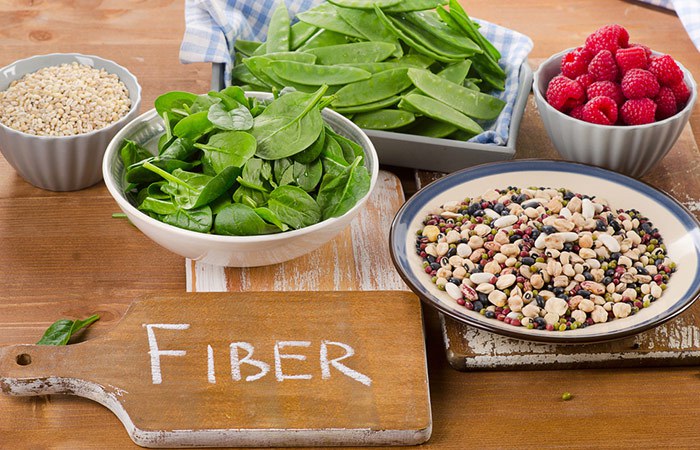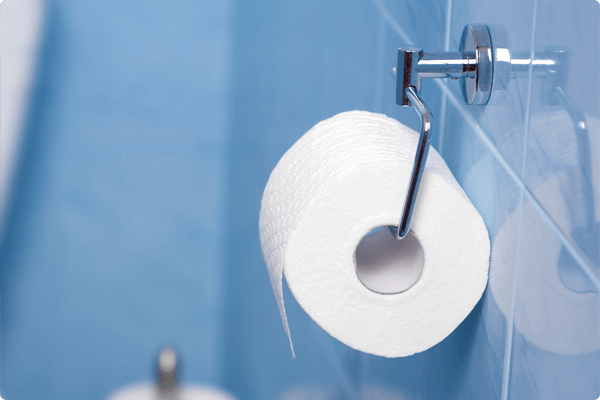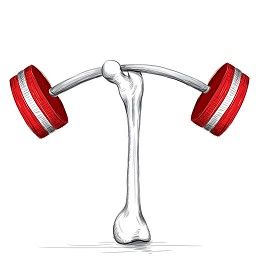The Many Benefits of a Fiber-Ful Diet
Towards the end of last year, I started looking back at my food diary and weight trends to see what’s working and what’s not. I do this kind of check-in regularly because I feel like the easiest way to accomplish a goal is to be wholly aware of your progress while you’re working towards it, and what I realized recently is that there is a new unsung hero in town, and its name is Fiber.

You can find fiber in so many delicious foods!
I know many of you are probably now gearing up for new workout regimes and diet plans for the new year, so I thought I would share some of the knowledge I have learned over my own journey, cause maybe it will help you, too!
Back to fiber.
No, I’m not about to get into how it’s been affecting my, uh, bathroom time, but I do think it warrants its own post so that you can see just how many benefits there are to getting adequate fiber in your diet.

Contrary to popular belief you won't be spending any more time in here than you're used to.
I’ve been absolutely blown away by how much fuller I feel without the bloat since I started adding a fiber supplement to my diet; usually, I put a scoop of fiber in my protein shake since it’s a quick and easy way to get the goods.
Without further ado, let’s dive into the many benefits of being fiber-full!
Reduced Risk of Type 2 Diabetes
Research shows that people who eat more fiber than the recommended daily minimum lowered their odds of getting Type 2 diabetes by up to 18% compared to those who consumed the minimum or less¹. This is due to fiber’s ability to keep blood sugar levels steady which also aids in weight management.
Reduced Risk of Heart Disease
A review of 22 studies published in the BMJ² showed that for every 7 grams of fiber taken daily, you risk of heart disease lowers by up to 9%. Fiber absorbs excess cholesterol in your system before it has a chance to clog your arteries making this little nutrient a heart-saving hero.

This heart's ready for any and everything, is yours?
Reduced Risk of Cancer
A study published in the Annals of Oncology³ showed that every 10 grams of fiber you ingest is associated with a 10% decrease in the risk for colorectal cancer and 5% decrease in the risk for breast cancer. In addition, the nutrient-dense foods you consume to get your fiber are rich in antioxidants and phytochemicals that help reduce those risks even further.
A Healthy Gut is a Happy Gut
Your gut bacteria needs to be nourished properly in order for you to reap the benefits of it, and the best way to keep that microbiome happy is with delicious fiber. When your gut is getting adequate fiber it produced what is known as short-chain fatty acids that aid in things like lowering systemic inflammation, something that has been widely linked the obesity.⁴
Assists in Weight Loss
I’m not saying that adding fiber to your diet is somehow the secret fast-acting solution to shedding those unwanted pounds, but it certainly helps the cause. In a recent study⁵, dieters who were told to ensure they were getting 30 grams of fiber in their daily consumption (and were given no other set parameters.) ended up losing nearly as much weight as an alternate group of dieters who were placed on a significantly stricter, low-calorie, low sugar, diet. Part of this might be because fiber-rich foods fill you up faster and keep you satisfied longer, meaning you’ll be less inclined to binge out on snacks. Fiber-full foods also, quite interestingly, bind themselves to fat and sugar molecules as your body works to digest them which results in reduced calorie consumption. So, yeah, they’re kind of magical.

You'll be dropping sizes in no time!
Assists in Maintaining Weight
Not all of us want to lose weight, and learning to maintain your weight can be a battle all it’s own. (Trust me.) Research from Georgia State University used clinical trials with mice to show that lack of soluble fiber in diets results in increased fat and weight gain, whereas mice who were given ample soluble fiber were seen to resist fat gain⁶. Not convinced by mice-based research? Well, a study⁷ at the Medical University of South Carolina conducted a similar experiment while monitoring humans, too. Their study showed that obese participants got on average 1 gram of fiber less than the normal-weight participants and those who received adequate fiber tended to be leaner overall (sounds like fat resistance, doesn’t it?)
Stay Regular
Like I said, I’m not about to go into my own personal details here, but this is important. Chronic constipation affects 15-30% of Canadians⁸ and occurs more frequently in women than it does men. Fiber makes it easier for your body to pass waste, so you’ll spend less time on the toilet and more time doing all those other fun things you love, like eating lots of fiber.
Strong Bones
Those soluble fibers we mentioned earlier that are found in things like asparagus, leeks, and oats are known a prebiotics and they have been shown to increase the bioavailability of important minerals like calcium which assist is bone density.⁹

Can your bones lift this much weight?
Convinced yet?
With so many benefits to adequate fiber, it would almost be foolish not to include fiber-rich foods in your diet. Again, if you’re anything like me and sometimes find it challenging to hit your fiber goals, a supplement goes a long way.
The national fiber recommendation for women is 18-50 is 25 grams or about 14 grams per 1000 calories consumed in your daily diet, so adjust accordingly. For men, you’re going to want to get between 30-38 grams. As usual, you need more than women.
So what are you waiting for, go load up your grocery cart with fiber-dense delights!
Did you like this post? Comment below if you'd like to see similar content or if there's another topic you'd like me to tackle!
Also, if anyone can teach me how to hyperlink in Steemit, that would be lovely :)
Sources:
- https://www.ncbi.nlm.nih.gov/pubmed/22218620\
- http://www.bmj.com/content/347/bmj.f7401
- https://academic.oup.com/annonc/article/24/4/1079/260447
- https://www.scientificamerican.com/article/fiber-famished-gut-microbes-linked-to-poor-health1/
- http://annals.org/aim/article-abstract/2118594/single-component-versus-multicomponent-dietary-goals-metabolic-syndrome-randomized-trial
- https://www.ncbi.nlm.nih.gov/pmc/articles/PMC4593822/
- https://login.medscape.com/login/sso/getlogin?urlCache=aHR0cDovL3d3dy5tZWRzY
- https://www.badgut.org/information-centre/a-z-digestive-topics/constipation/2FwZS5jb20vdmlld2FydGljbGUvNzg5MTM3&ac=401
- https://www.sciencedaily.com/releases/2016/08/160822152622.htm
thanks for sharing this content, is very important, I have been considering become into vegetarian for several months, meanwhile i just try to eat less meat and more fiber.
Thanks for reading!
I have been trying to reduce my overall meat in take as well, it can certainly be challening at times! But I have been coming across some great looking vegetarian recipes as well so I'm hopeful that I'll do better this year than last :)